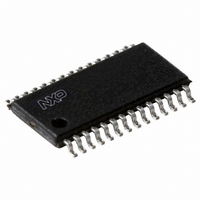SC16IS762IPW,112 NXP Semiconductors, SC16IS762IPW,112 Datasheet - Page 11

SC16IS762IPW,112
Manufacturer Part Number
SC16IS762IPW,112
Description
IC DUAL UART 64BYTE 28TSSOP
Manufacturer
NXP Semiconductors
Datasheet
1.SC16IS752IBS151.pdf
(59 pages)
Specifications of SC16IS762IPW,112
Features
Low Current
Number Of Channels
2, DUART
Fifo's
64 Byte
Protocol
RS232, RS485
Voltage - Supply
2.5V, 3.3V
With Auto Flow Control
Yes
With False Start Bit Detection
Yes
With Modem Control
Yes
Mounting Type
Surface Mount
Package / Case
28-TSSOP (0.173", 4.40mm Width)
For Use With
568-4000 - DEMO BOARD SPI/I2C TO DUAL UART568-3510 - DEMO BOARD SPI/I2C TO UART
Lead Free Status / RoHS Status
Lead free / RoHS Compliant
Other names
568-4021-5
935279294112
SC16IS762IPW
SC16IS762IPW
935279294112
SC16IS762IPW
SC16IS762IPW
NXP Semiconductors
SC16IS752_SC16IS762_7
Product data sheet
7.3.1 Receive flow control
7.3.2 Transmit flow control
There are two other enhanced features relating to software flow control:
When software flow control operation is enabled, the SC16IS752/SC16IS762 will
compare incoming data with Xoff1/Xoff2 programmed characters (in certain cases, Xoff1
and Xoff2 must be received sequentially). When the correct Xoff characters are received,
transmission is halted after completing transmission of the current character. Xoff
detection also sets IIR[4] (if enabled via IER[5]) and causes IRQ to go LOW.
To resume transmission, an Xon1/Xon2 character must be received (in certain cases
Xon1 and Xon2 must be received sequentially). When the correct Xon characters are
received, IIR[4] is cleared, and the Xoff interrupt disappears.
Xoff1/Xoff2 character is transmitted when the RX FIFO has passed the halt trigger level
programmed in TCR[3:0], or the selectable trigger level in FCR[7:6].
Xon1/Xon2 character is transmitted when the RX FIFO reaches the resume trigger level
programmed in TCR[7:4], or falls below the lower selectable trigger level in FCR[7:6].
The transmission of Xoff/Xon(s) follows the exact same protocol as transmission of an
ordinary character from the FIFO. This means that even if the word length is set to be 5, 6,
or 7 bits, then the 5, 6, or 7 least significant bits of Xoff1/Xoff2, Xon1/Xon2 will be
transmitted. (Note that the transmission of 5, 6, or 7 bits of a character is seldom done, but
this functionality is included to maintain compatibility with earlier designs.)
It is assumed that software flow control and hardware flow control will never be enabled
simultaneously.
•
•
Xon Any function (MCR[5]): Receiving any character will resume operation after
recognizing the Xoff character. It is possible that an Xon1 character is recognized as
an Xon Any character, which could cause an Xon2 character to be written to the
RX FIFO.
Special character (EFR[5]): Incoming data is compared to Xoff2. Detection of the
special character sets the Xoff interrupt (IIR[4]) but does not halt transmission. The
Xoff interrupt is cleared by a read of the Interrupt Identification Register (IIR). The
special character is transferred to the RX FIFO.
Figure 7
Dual UART with I
Rev. 07 — 19 May 2008
shows an example of software flow control.
2
SC16IS752/SC16IS762
C-bus/SPI interface, 64-byte FIFOs, IrDA SIR
© NXP B.V. 2008. All rights reserved.
11 of 59















